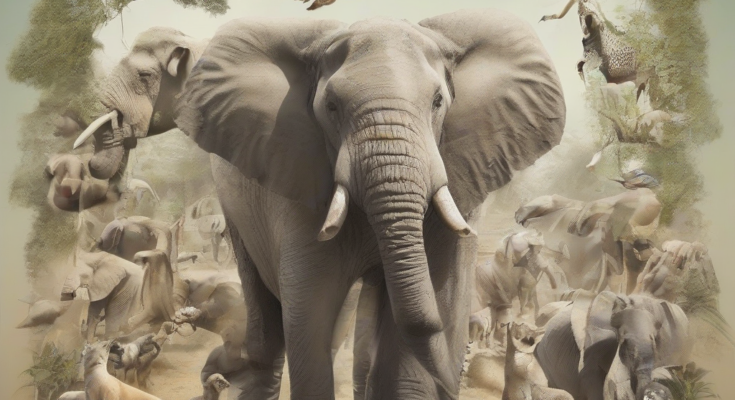Igniting a Global Spark: The Urgent Need for World Wildlife Donations
The planet’s biodiversity is in crisis. From the majestic elephant roaming the African savanna to the elusive snow leopard prowling the Himalayan peaks, countless species teeter on the brink of extinction. Habitat loss, poaching, climate change, and human encroachment are relentless forces, pushing wildlife populations towards catastrophic decline. This isn’t just an ecological tragedy; it’s a humanitarian crisis, impacting livelihoods, food security, and the overall health of our planet. The solution requires a global response, and a crucial element of that response is the power of world wildlife donations.
Donations, large and small, are the lifeblood of countless conservation organizations working tirelessly to protect endangered species and their habitats. These organizations are on the frontlines, battling illegal wildlife trade, combating habitat destruction, and implementing vital conservation programs. Without the support of donors, their vital work would be severely hampered, leaving vulnerable animals even more exposed to the threats that endanger them.
Understanding the Urgency: Why Your Donation Matters
- Combating Poaching: The illegal wildlife trade is a multi-billion dollar industry, fueling the slaughter of countless animals for their body parts, often destined for black markets around the world. Donations help fund anti-poaching patrols, equip rangers with advanced technology, and support community-based conservation initiatives that offer alternative livelihoods to those involved in poaching.
- Protecting Habitats: Habitat loss is the single greatest threat to wildlife. Deforestation, agricultural expansion, and urbanization are shrinking natural habitats, leaving animals with less space to roam, feed, and breed. Donations support the acquisition and protection of critical habitats, creating safe havens for vulnerable species.
- Combating Climate Change: Climate change is exacerbating existing threats, altering ecosystems and creating new challenges for wildlife. Donations fund research into the impacts of climate change on wildlife, support adaptation strategies, and promote sustainable practices that mitigate the effects of climate change.
- Supporting Conservation Research: Scientific research is crucial for understanding the challenges faced by wildlife and developing effective conservation strategies. Donations fund research projects that track animal populations, study their behavior, and identify the most pressing threats to their survival.
- Empowering Local Communities: Many conservation efforts are most effective when they engage local communities. Donations support community-based conservation initiatives that provide alternative livelihoods, raise awareness about wildlife conservation, and empower local people to protect their natural resources.
- Providing Veterinary Care: Injured or sick animals often require specialized veterinary care. Donations help fund wildlife rescue centers and provide crucial medical treatment to animals in need.
- Educating Future Generations: Conservation efforts must be sustained for the long term. Donations support educational programs that raise awareness about wildlife conservation, inspire future generations to become stewards of the environment, and promote responsible behavior towards wildlife.
The Ripple Effect of Your Donation: A Global Impact
The impact of your donation extends far beyond a single animal or a specific conservation project. It creates a ripple effect, influencing entire ecosystems and the lives of countless people. By supporting conservation efforts, you are contributing to:
- Biodiversity Preservation: Protecting wildlife ensures the preservation of biodiversity, the intricate web of life that sustains our planet. A loss of biodiversity can have devastating consequences for ecosystems and human well-being.
- Ecosystem Services: Wildlife plays a crucial role in maintaining healthy ecosystems, providing essential services such as pollination, water purification, and climate regulation. The loss of wildlife can disrupt these vital services, impacting human livelihoods and the environment.
- Economic Stability: Ecotourism and other wildlife-related industries provide significant economic benefits to local communities. Protecting wildlife helps to ensure the long-term sustainability of these industries.
- Cultural Heritage: Wildlife holds significant cultural and spiritual value for many communities around the world. Protecting wildlife helps to preserve these cultural traditions and heritage.
- Global Health: The health of wildlife is inextricably linked to human health. Emerging infectious diseases often originate in wildlife populations, highlighting the importance of protecting biodiversity to reduce the risk of future pandemics.
Choosing the Right Organization: Making Your Donation Count
With numerous conservation organizations operating globally, choosing the right one to support can feel overwhelming. To maximize the impact of your donation, consider these factors:
- Transparency and Accountability: Look for organizations that are transparent about their finances and demonstrate accountability in their operations. Check their websites for annual reports and financial statements.
- Impact Measurement: Assess the organization’s ability to measure and report on the impact of its programs. Look for evidence of measurable results and demonstrable success.
- Specific Focus: Consider whether you want to support organizations focusing on specific species, habitats, or conservation strategies. Focusing your donation can have a more targeted impact.
- Community Engagement: Support organizations that actively engage local communities in their conservation efforts. Community-based conservation is often the most sustainable and effective approach.
- Reputation and Recognition: Research the organization’s reputation within the conservation community. Look for organizations that are widely respected and recognized for their expertise and effectiveness.
Beyond Monetary Donations: Other Ways to Help
While monetary donations are crucial, there are many other ways to contribute to world wildlife conservation:
- Volunteer Your Time: Many conservation organizations rely on volunteers to assist with various tasks, from data entry to habitat restoration. Offering your time and skills can make a significant contribution.
- Spread Awareness: Educate yourself and others about the threats facing wildlife and the importance of conservation. Share information on social media, participate in conservation events, and advocate for wildlife protection.
- Make Sustainable Choices: Reduce your environmental footprint by making conscious choices in your daily life, such as reducing your consumption, supporting sustainable businesses, and reducing your carbon emissions.
- Advocate for Policy Change: Contact your elected officials to advocate for stronger wildlife protection laws and policies. Your voice can make a difference in shaping government action.
- Support Ethical Tourism: When travelling, choose to support businesses that prioritize sustainability and wildlife conservation. Avoid activities that exploit or harm wildlife.
The fight to save the world’s wildlife is a collective responsibility. Every donation, no matter how small, contributes to a larger movement that is working tirelessly to protect our planet’s precious biodiversity. By supporting world wildlife donations, we are investing in a future where wildlife thrives, ecosystems flourish, and the natural world continues to inspire and sustain us for generations to come.

